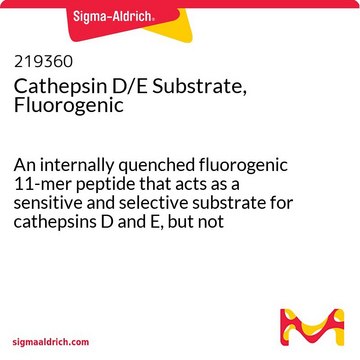219399
Cathepsin D Substrate I
Useful as a substrate for the determination of cathepsin D activity.
Synonym(s):
Cathepsin D Substrate I, Bz-RGFFP-4-MeOβNA, HCl
Sign Into View Organizational & Contract Pricing
All Photos(1)
About This Item
Empirical Formula (Hill Notation):
C49H55N9O7 · xHCl
Molecular Weight:
882.02 (free base basis)
UNSPSC Code:
51111800
NACRES:
NA.77
Recommended Products
Quality Level
assay
≥95% (HPLC)
form
lyophilized solid
manufacturer/tradename
Calbiochem®
storage condition
OK to freeze
desiccated
protect from light
color
white
solubility
DMSO: 5 mg/mL
fluorescence
λex ~345 nm
λem ~425 nm
shipped in
ambient
storage temp.
−20°C
General description
A useful substrate for colorimetric or fluorometric assay of cathepsin D activity. Cathepsin D hydrolyzes the Phe-Phe bond. Dipeptidyl aminopeptidase II is required to free the 4-methoxy-β-naphthylamine (4MβNA). Excitation max: ~345 nm; emission max: ~425 nm.
Useful as a substrate for the determination of cathepsin D activity. Suitable for either colorimetric or fluorometric assay. Cathepsin D hydrolyzes the Phe-Phe bond. Requires dipeptidyl aminopeptidase II to free 4-methoxy-β-naphthylamine (4MeOβNA).
Biochem/physiol Actions
Cell permeable: no
Primary Target
Substrate for the determination of cathepsin D activity
Substrate for the determination of cathepsin D activity
Product does not compete with ATP.
Reversible: no
Warning
Toxicity: Standard Handling (A)
Sequence
Bz-Arg-Gly-Phe-Phe-Pro-4MeOβNA, HCl
Other Notes
Takahashi, T., and Tang, J. 1981. Methods Enzymol.80, 565.
Smith, R.E., and Van Frank, R.M. 1975. in Lysosomes in Biology and Pathology4 (Dingle, J.T., and Dean, R.T., eds.) p. 193, American Elsevier, Holland.
Smith, R.E., and Van Frank, R.M. 1975. in Lysosomes in Biology and Pathology4 (Dingle, J.T., and Dean, R.T., eds.) p. 193, American Elsevier, Holland.
Legal Information
CALBIOCHEM is a registered trademark of Merck KGaA, Darmstadt, Germany
Storage Class
11 - Combustible Solids
wgk_germany
WGK 1
flash_point_f
Not applicable
flash_point_c
Not applicable
Certificates of Analysis (COA)
Search for Certificates of Analysis (COA) by entering the products Lot/Batch Number. Lot and Batch Numbers can be found on a product’s label following the words ‘Lot’ or ‘Batch’.
Already Own This Product?
Find documentation for the products that you have recently purchased in the Document Library.
Our team of scientists has experience in all areas of research including Life Science, Material Science, Chemical Synthesis, Chromatography, Analytical and many others.
Contact Technical Service